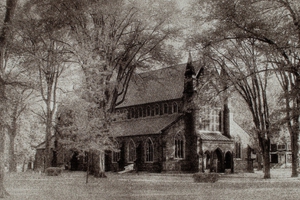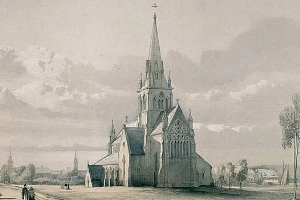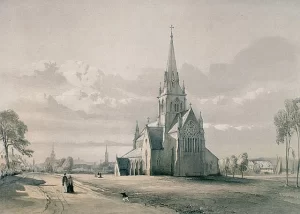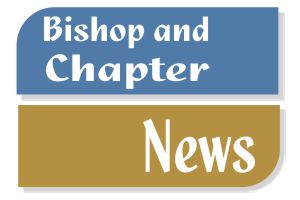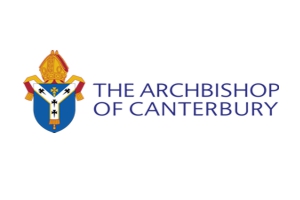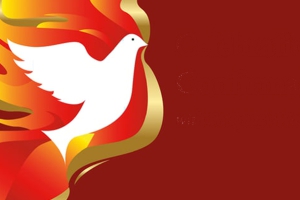An Account of the Laying of the Foundation Stone of the Cathedral in Fredericton,
October 15, 1845
Church in the Colonies. No. XI.
Diocese of Fredericton.
London: The Society for the Propagation of the Gospel, February, 1846.
In ancient times the Cathedrals of Old England, which are still the glory and ornament of that country, and are now more visited and admired than ever, were built by the Bishops of the respective Sees, assisted by the multitude of the faithful, who rejoiced to pour their offerings into the treasury of God. In faith the work was begun; the builders died, and left their work unfinished, but others took it up, and by God's help brought it to an end. But the Colonies of England, though every where dispersed, knew no such glory; and for a long season the gathering in of the "unrighteous mammon" seemed to be the sole end of colonization. At length, the note of preparation is heard, and in more than one Colony God's servants "think upon the stones" of his Church, and "it pitieth them to see her in the dust." New Brunswick is one of the first Colonies in which the foundation stone has been actually laid: an event the more remarkable, when we reflect, that no such work has been begun since the Norman Conquest, that is, for the last 700 years; a work in which the goodness of God is manifestly made known towards us.
As many persons are interested in the success of the undertaking, the following account may not be unacceptable.
On Wednesday the 15th of October, pursuant to a notice signed by the Lord Bishop, a procession was formed at the Province Hall, a short time before three o'clock in the afternoon, and the whole body proceeded to the ground in the following order:--
The Band of the 33d Regiment of Foot.
The Officers of the Regiment.
His Excellency the Lieutenant Governor in Military Uniform.
The Members of the Legislative Council.
His Honour the Chief Justice, the Master of the Rolls.
Mr. Justice Carter. Mr. Justice Parker.
Members of the House of Assembly, and Members of the Bar.
The Lord Bishop, bearing his Pastoral Staff.
The Archdeacon, The Bishop's Chaplain,
And 19 other Clergy in their Robes.
Inhabitants of Fredericton and other parts of the Province.
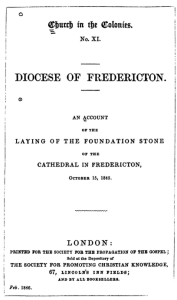
The Bishop, presenting His Excellency with a silver trowel, (the gift of Mr. Spahn, of Fredericton,) requested him to lay the foundation stone of the new Cathedral, and, previous to the ceremony, offered up the following Prayer:--
O LORD, mighty and glorious, who fillest all things with thy presence, and canst not be contained within the bounds of heaven and earth, much less within these narrow walls, yet dost vouchsafe to accept the poor endeavours of thy humble servants allotting special places for thy worship; we humbly beseech thee to accept this day's service of separating this place from worldly uses, and marking it out to be hereafter wholly dedicated to thy glorious name. Accept, O Lord, the offering of this spot at the hands of those who have faithfully given it unto thee. Prosper the work, and those who build in it. Make it thy holy dwelling place for evermore. Let it be hereafter consecrated and made wholly thine by the ministry of thine appointed Pastor. Here may prayers, supplications, intercessions, and giving of thanks be made for all men: here may thy sacred word be read, preached, heard, and blessed. And be present with us, O Lord, at this time, and with all who shall hereafter minister or worship in this place; and consecrate us unto an Holy Temple unto thyself, dwelling in our hearts by faith, and thoroughly cleansing us from all worldly and carnal affections, that we may be devoutly given to serve thee in all good works. Thus may we ever continue in the mystical body of thy blessed Son our Lord; and united in the bonds of a true faith, a lively hope, and a never-failing charity, may we, after this short life ended, enter with joy thy everlasting kingdom, and be built up as pillars in the temple of our God, to go no more out for evermore.--Amen.
The prayer ended, the Stone was raised, and His Excellency proceeded to deposit the bottle containing a few coins, with an inscription written on parchment, in a cavity of the large block of granite selected for the Foundation Stone.
The following is a copy of the Inscription:--
In Honorem Dei Opt: Max:
Patris, Filii, et Spiritus Sancti,
Ecclesia¦ hujus Cathedralis
Fundamenta jecit
GULIELMUS G.M. COLEBROOKE, Eques Hanovensis,
Provincial Nova-Brunsvicensis, pro hac vice Legatus,
Res divinas peragente JOANNE MEDLEY,
Episcopo Frederico-politano.
Anno Episcopatus Primo.
Idibus Octob: MDCCCXLV.
The Stone having been lowered with the accustomed formalities, His Excellency proceeded to address those present as follows:--
"My Lord Bishop, Reverend Gentlemen, and Gentlemen,
"Called by your indulgence, and at the special request of you, my Lord, our respected and esteemed diocesan, to take a prominent part in laying the Foundation Stone of this Cathedral about to be erected, I cannot but regard it as an occasion for solemn thankfulness that I should thus be associated.
"To any one who has beheld the noble structures which by the piety of our ancestors have been raised to the honour of God in our Mother Country, I can appeal for an acknowledgment of those feelings which their contemplation awakens. I have ever considered that the elevation of our Gothic spires--contrasted as they are in this respect with the temples of heathen antiquity--are calculated to inspire those lofty and sublime emotions which are the peculiar attributes of our Christian faith.
"To our worthy Bishop, Gentlemen, we are indebted for the pains he has taken in obtaining for us a fine model for the Edifice we are about to raise, and which I may be permitted devoutly to anticipate will long endure after we shall have passed away, though not, as I hope, to be obliterated from the pious remembrances of those who may succeed us and witness its completion.
"There is something at once solemn, impressive, and consoling in the reflection, amidst the perishing elements around us, and the cares and vicissitudes of our brief existence, that we are contributing to rear a solid and imposing structure, to be dedicated to the worship of that Being who has ever existed and will ever exist, and 'whose service is perfect freedom;' and as Englishmen we must feel grateful, that it has pleased Him to put it into the hearts of our fellow-countrymen at home to assist our slender resources in such an undertaking.
"Till this hour, and for more than forty years, we may consider that we have been wanderers in the Wilderness, though not, as I trust, without the Ark being with us in our wanderings, which is henceforth to find a habitation and a resting place.
"It is pleasing also to reflect that--as in the erection of the first Temple, and in the more memorable foundation of the Christian Church--the period chosen for our solemn dedication is one of universal peace--our country, in the full career of her high and honourable destiny, respected amongst the nations of the world for her piety and her charity, as she has been in the day of trial, with the blessing of God, in her martial achievements.
"It has been said, that the sun never rises nor sets upon Englishmen; and wherever it shines upon them, whether in the temperate or the torrid zone, by sea or by land, may they never forget the hand that has hitherto conducted them through perils; or, that they are engaged in the service of Him, who has promised to those who faithfully serve Him, to be with and sustain them always, and to build his temple in their hearts.
"It has been my lot to visit many regions where Englishmen have lived and died, far remote from the sepulchres of their country; and from the sense of desolation to which the impression has often given rise, it is to me an especial consolation to witness in the latter part of my life, the growing expansion in the East and in the West, of our ancient and venerable Church, destined, as I believe, by the Providence which watches over us, and sanctifies our labours, to sustain her part in the spread of the Gospel, the herald of 'peace on earth, and good will towards men.'
"The occasion may not inappropriately suggest to our minds the words of the Prophet--
'Behold, I lay in Zion for a foundation, a stone, a tried stone, a precious cornerstone, a sure foundation.
'Judgment also will I lay to the line, and righteousness to the plummet.'--Isa. xxviii. 16, 17.
The Lord Bishop then spoke to the following effect:--
"Sir William Colebrooke and Gentlemen,
"It affords me the greatest gratification to hear from your Excellency, sentiments to which every Christian heart must respond, and to find myself, on this eventful day, surrounded by the Judges and Law Officers of the Province, by Members of the Legislative Council and House of Assembly, and by men high in station in the Province, and distinguished for their talents, who have, with a unanimity worthy of the occasion, come forward to support this great undertaking. The building a Cathedral in this Province may in some sense be called a National work: for whatever reflects the genius, the piety, and the glory of England, adds lustre to the nation from which the original idea is derived. It is in many other respects important; not only as a national type of the unity of the Church, but as a consecration to God on the part of man of all those gifts which God has been pleased to vouchsafe to him. For when do we glorify God so much as when we consider nothing to be properly our own, when we look upon all as His, lent to us for our use, but to be given back to Him, the great and glorious giver, and employed in His peculiar worship and service. Thus whatever our gifts be, whether they be gold and silver, whether they be wood or stone, whether they be skill in carving, force and eloquence in utterance, sweetness in music, taste in decoration, all are well used and employed, in the material expression of our inward thanks and praise, of our love and devotion to His glorious name.
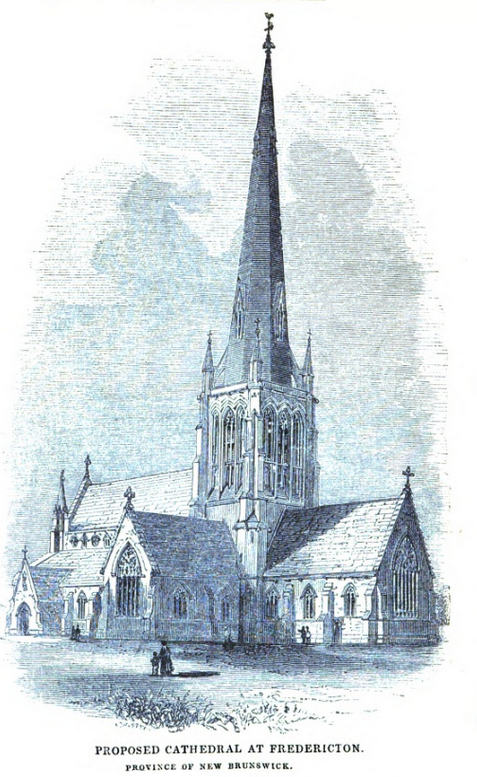
"I am well aware that to the foundation of a Cathedral in this Province some persons may object that the money might be better expended than in what appears to them to be a lavish and wasteful expenditure, and needless display of ornament on the house of God. I for one fearlessly appeal to the laity of this country, and plainly ask them, whether the foundation of a Cathedral is not accompanied by a simultaneous movement on the part of the Church, to extend and improver her Missions, and to diffuse the glad tidings of the Gospel to the remotest corners of the Province, and whether there be not an anxiety on the part of the founders of the Cathedral, to promote the welfare of the poorest Church, and of the most uneducated and needy settlers.
"But let us join issue with such objectors on the footing of Scripture; let us ask them, whether they recollect that on a single building, 90 feet long by 30 wide, every part of which was built by express direction from the Almighty, vouchsafed in writing, no less a sum than three or four millions of our money was expended?
"And if under any dispensation whatever, Almighty God would never have sanctioned any thing morally wrong, why should we object to what has the direct sanction of the Old Testament, and is no where forbidden in the New? And when this so much praised plainness is carried out into the houses of the objectors themselves, when, in proportion to their increased means, men cease to ornament and fill with splendid furniture their own 'ceiled houses,' it will be time to let God's house lie waste, and to strip it of the ornaments which a grateful heart may bestow upon it. Such parts, however, of every such building, are probably better bestowed as gifts, than taken from the general fund appropriated for the fabric.
"Having disposed, as it seems to me, of this objection, it remains that I endeavour to impress upon this large assembly the duty of united and zealous co-operation. This Cathedral Church will best be built by our adopting the excellent Cornish motto "One and all;" by our reflecting that if we have little, "we should do our diligence to give of that little;" but if we have ample means, an abundant contribution will alone ensure its acceptance from the Almighty.
"Would to God, indeed, that every one who hears me this day could have worshipped within the walls of one of our glorious Cathedrals in Old England! Then I am sure I should not need to urge on you this duty, but your own zeal would outrun my desires. Recollect, that though built in Fredericton, it belongs to the Province; the design was conceived, and the first contributions were raised in the Mother Country, and it would indeed be a disgrace to New Brunswick if the efforts of Englishmen were not seconded here. But I believe they will be seconded. The attendance here of so many from all parts of the Province, the zeal of all classes and conditions of men, the kind and generous feelings already exhibited, put it beyond a doubt, that if we be only true to ourselves and to God, and do not suffer ourselves to be disheartened by the cry of the desponding, the work will be done; and we, by God's grace, shall live, some of us, to see the topmost stone erected, and it will be a joy to some of the children whom I see around me to say, when they reach old age, My parents helped to rear the stones of that Cathedral Church, and my children's children will rise up and call the builders blessed.
"I have now only once more to return you all my sincere thanks for your kindness in attending, for your active support, and likewise to the Officers and Band of the 33d Regiment, who have so cheerfully rendered their assistance on this solemn occasion.
"Let us conclude, as we began, with prayer."
When His Lordship had concluded his Address, he proceeded to use the following Prayer:--
"O GOD, who hast built thy Church on the foundation of the Apostles and Prophets, Jesus Christ himself being the Chief Corner Stone; we give thee humble thanks that thou hast called us to the clear knowledge and light of thy Gospel in thy most blessed Son by the Holy Spirit.
"We bless thee that thou hast at this time given us the opportunity to lay the foundation of this House of God. May it be raised in due season to be a most Holy Temple unto thee--'where our prayers may ascend up before thee as incense, and the lifting up of our hands as the evening sacrifice.'
"Finally, we give thee most high praise and hearty thanks for all thy servants departed this life in thy faith and fear. Patriarchs, Prophets, Apostles, Martyrs, and all others, whom thou hast delivered from the miseries of this wretched world, from the body of death and all temptation, and who have committed their souls into thy holy hands, as into sure consolation and rest: whose examples teach us to follow.
"Grant, we beseech thee, that we with them may fully receive thy promises, and be made perfect altogether; and being set on thy right hand in the place where there is neither weeping, sorrow, nor heaviness, may hear those most sweet and comfortable words--'Come to me, ye blessed of my Father, possess the kingdom prepared for you from the beginning of the world.'"
The 100th Psalm was then sung by the assembled multitude, the Band taking the instrumental part: after which, the Lord Bishop gave the Blessing, and the Procession moved back to the Province Hall, and dispersed.
